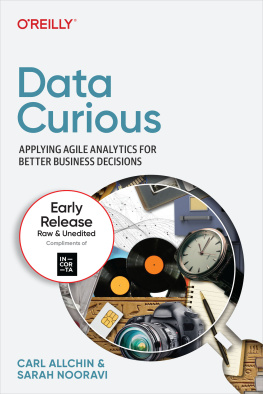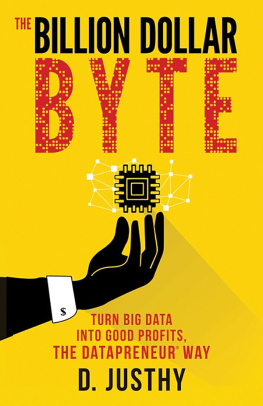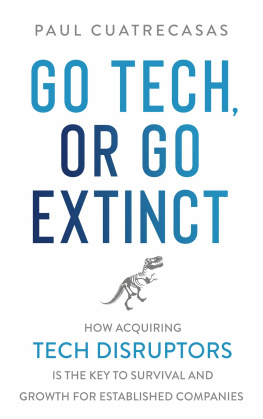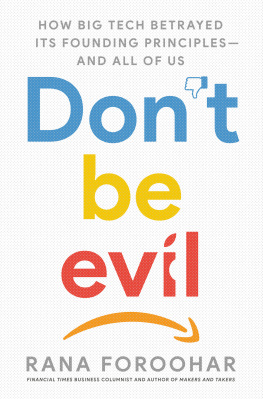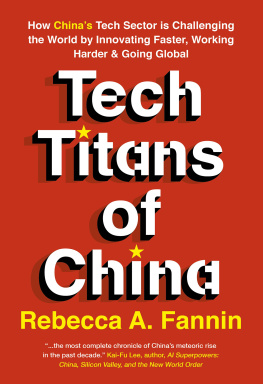Veronica Barassi - Child Data Citizen: How Tech Companies Are Profiling Us from before Birth
Here you can read online Veronica Barassi - Child Data Citizen: How Tech Companies Are Profiling Us from before Birth full text of the book (entire story) in english for free. Download pdf and epub, get meaning, cover and reviews about this ebook. publisher: MIT Press, genre: Politics. Description of the work, (preface) as well as reviews are available. Best literature library LitArk.com created for fans of good reading and offers a wide selection of genres:
Romance novel
Science fiction
Adventure
Detective
Science
History
Home and family
Prose
Art
Politics
Computer
Non-fiction
Religion
Business
Children
Humor
Choose a favorite category and find really read worthwhile books. Enjoy immersion in the world of imagination, feel the emotions of the characters or learn something new for yourself, make an fascinating discovery.

- Book:Child Data Citizen: How Tech Companies Are Profiling Us from before Birth
- Author:
- Publisher:MIT Press
- Genre:
- Rating:4 / 5
- Favourites:Add to favourites
- Your mark:
- 80
- 1
- 2
- 3
- 4
- 5
Child Data Citizen: How Tech Companies Are Profiling Us from before Birth: summary, description and annotation
We offer to read an annotation, description, summary or preface (depends on what the author of the book "Child Data Citizen: How Tech Companies Are Profiling Us from before Birth" wrote himself). If you haven't found the necessary information about the book — write in the comments, we will try to find it.
Child Data Citizen: How Tech Companies Are Profiling Us from before Birth — read online for free the complete book (whole text) full work
Below is the text of the book, divided by pages. System saving the place of the last page read, allows you to conveniently read the book "Child Data Citizen: How Tech Companies Are Profiling Us from before Birth" online for free, without having to search again every time where you left off. Put a bookmark, and you can go to the page where you finished reading at any time.
Font size:
Interval:
Bookmark:
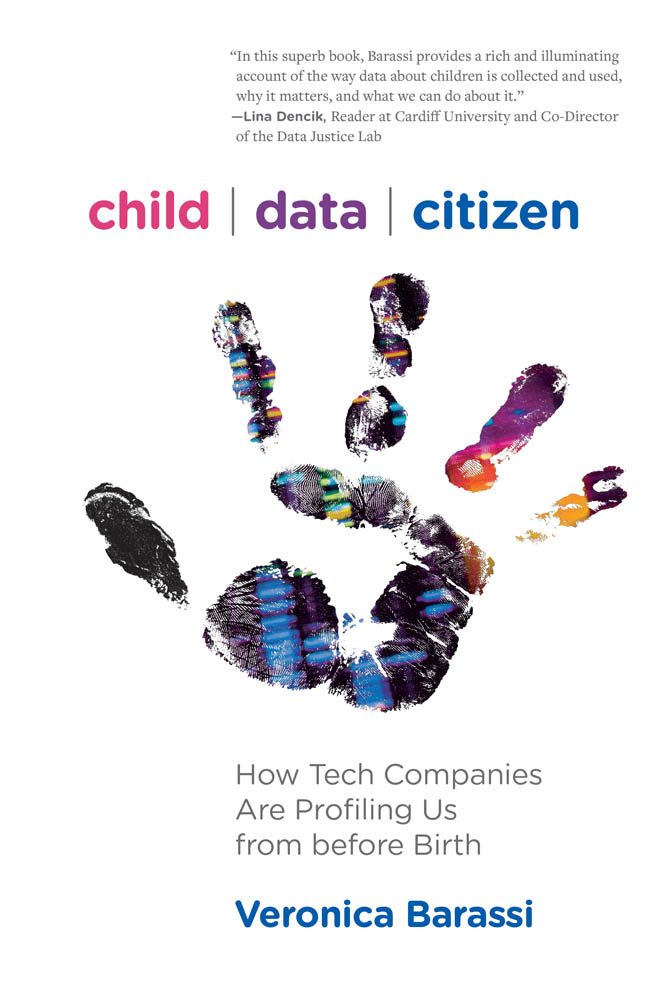
CHILD | DATA | CITIZEN
HOW TECH COMPANIES ARE PROFILING US FROM BEFORE BIRTH
VERONICA BARASSI
The MIT Press
Cambridge, Massachusetts
London, England
2020 Massachusetts Institute of Technology
All rights reserved. No part of this book may be reproduced in any form by any electronic or mechanical means (including photocopying, recording, or information storage and retrieval) without permission in writing from the publisher.
Library of Congress Cataloging-in-Publication Data
Names: Barassi, Veronica, author.
Title: Child data citizen : how tech companies are profiling us from before birth / Veronica Barassi.
Description: Cambridge, Massachusetts : The MIT Press, [2020] | Includes bibliographical references and index.
Identifiers: LCCN 2020015011 | ISBN 9780262044714 (paperback)
Subjects: LCSH: Children--Research. | Data mining. | Consumer profiling. | Citizenship.
Classification: LCC HQ767.85 .B37 2020 | DDC 305.23072--dc23
LC record available at https://lccn.loc.gov/2020015011
d_r0
For my daughters
LIST OF FIGURES
Google blog on the introduction of Knowledge Graph.
Ovias promotional blurb in the app store.
).
Universities Colleges Admission Services Media website.
Manage your Amazon Household page.
Manage Your Amazon Household.
Using Household profiles on Alexa.
Amazons Childrens Privacy Disclosure.
Google terms and conditions (2019).
).
Fama Technologies website.
I wrote this book for my daughters, my family, and all the parents and families I met in this life-changing and personal research journey. I owe them everything. Their stories, their thoughts, and their everyday experiences have shaped my understanding of the injustice of surveillance capitalism. They made this book possible; they inspired me, questioned me, surprised me, and reminded me of why we need publicly engaged ethnographic research. I doubt that I will ever be able to convey how much I owe them.
My immense gratitude goes also to my colleagues and friends who have supported me throughout the way. I am thankful for their work, amazing minds, advice, collegiality, critical thinking, and passion for research. Without their support, I would have never been able to finish this project and book. Again there are no real words to express my gratitude.
I would like to thank in particular Lina Dencik, Mila Steele, and Melissa Sevasti-Nolas for being such amazing friends, believing in this book, and making it better with their observations, thoughts, and ideas. I also would like to thank Ben Williamson for his generosity and comments. Without their input this book would have been very different.
The Child | Data | Citizen project would have not been possible without the academic and emotional support of different scholars and friends. I personally would like to thank, Natalie Fenton, Leah Lievrouw, Sonia Livingstone, Nick Couldry, Annette Markham, and Greg Elmer for being there for me during these life-changing times. They have been a constant source of motivation and support. I am deeply indebted to them.
In the last three years different colleagues have inspired me with their work and our discussions. A special thanks goes also to Adrienne Russell, Emiliano Trer, Alice Mattoni, Anastasia Kavada, Stefania Milan, Thomas Poell, Mirca Madianou, Gholam Khiabany, Des Freedman, Milly Williamson, Richard MacDonald, Angela MacRobbie, Clea Bourne, Aeron Davis, Lisa Blackman, Joanna Redden, Arne Hintz, Dan McQuillan, Elefetheria Lekakis, Anne Kaun, Giovanna Mascheroni, Tama Leaver, Tom Boellstorff, Mimi Ito, and Sarah Pink.
I would also like to thank the Department of Media, Communications and Cultural Studies at Goldsmiths and the British Academy for having believed in this project and for giving me their institutional support. I am also profoundly grateful to my friend Craig Barrett for helping me with the design and running of the Child | Data | Citizen website, which has been an invaluable resource for this project.
All my gratitude goes to my family. It goes to my parents, Patrizia and Gianni, for their unconditional love, support, and for being the best examples I have in life. It also goes to my sister Bradawho is always there for me, listens, and encourages me all the timeand to my niece and Ale. Finally, I am really not sure where I can find the right words to thank Paul, my husband, who has read the book from cover to cover, commented, pushed me to achieve more, and always supported me no matter what. In the craziness of our cross-continental life, he has always been there together with my daughters, filling my life with joy and excitement. Thank you.
I feel like data is being collected all over and misinterpreted. I feel like they have so much faith in what their algorithms tell them, that you are no longer yourself, but you are just what the algorithm says you are. And its all a guess right? They sell you products or they tell you which candidate to vote on the basis of that data. But I dont think that data is accurate. Its kind of the labeling theory. In the sense that you may start to believe who you are as an individual on the basis of what they say you are. Everything is becoming more integrated. More and more. But you cant get away from the technology, because its cheaper and easier; but at the same time you are signing off your personal data.
Carlos, west Los Angeles, graphic designer, two children aged 5 and 7 years
Carlos is a designer; he grew up in central California from a family of Mexican-American farmers and moved to Los Angeles in his early twenties to start his career. When I interviewed him for the Child | Data | Citizen project, Carlos told me of his concern about the ways in which he and his children were being profiled because of their data. In the interview, I asked him to describe what it felt like when he thought about online privacy, especially in relation to his children. As I listened to what he had to say, I realized he couldnt have explained it better. That was what data profiling felt like to me too, the feeling that your data is constantly collected from you and that you have no choice. Either you sign off your personal information or you are cut out from an array of services and relationships. There is also that sense that you cant get away from technology. Everyday life is defined by that untold feeling that it is impossible to escape technologies that monitor and turn us and our children into data.
Examples are countless. Wherever we turn, we encounter a plurality of technologies that gather, archive, and process our personal data and the personal data of our children. We can think about the facial recognition software used by an airport security guard on our 10-month-old daughter or the smart basinet that our in-laws bought for their first grandson. We can also think about all the times that we signed off our personal data and the data of our children without reading the terms and conditions, which are oftenand even after the introduction of the General Data Protection Regulation (GDPR) in Europetoo difficult, too long, and too vague to understand. Finally, there is that feeling of unease and worry as we start to realize that our personal data is constantly used to profile, sort, or turn us into data subjects.
Like Carlos, I and different parents I met during the project were starting to deal with these questions. Why is our family life being turned into data? How is this data being used? How are we being profiled? Are these algorithmic predictions accurate, orlike Carlos mentionedare they just a random guess based on imprecise data traces? How will these algorithmic predictions impact our lives and the lives of our children?
Font size:
Interval:
Bookmark:
Similar books «Child Data Citizen: How Tech Companies Are Profiling Us from before Birth»
Look at similar books to Child Data Citizen: How Tech Companies Are Profiling Us from before Birth. We have selected literature similar in name and meaning in the hope of providing readers with more options to find new, interesting, not yet read works.
Discussion, reviews of the book Child Data Citizen: How Tech Companies Are Profiling Us from before Birth and just readers' own opinions. Leave your comments, write what you think about the work, its meaning or the main characters. Specify what exactly you liked and what you didn't like, and why you think so.

